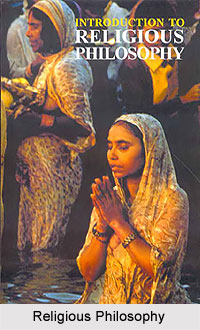 Indian religious Philosophy, Indian philosophy and Indian spirituality all possess the self-same source. Philosophy in the Indian context has religion, spirituality and faith being absolutely interlinked with each sublime aspect or thought. Religion in Indian philosophy has essayed a crucial role, both for the God-believer and the atheist, with Hindu philosophy leading the way. Religious influence on Indian philosophy is also defined in another context. The concept of Dharma makes it clear that its intention was to maintain and safe-keep order in society. This order can be preserved if every individual regards every other being as the creation of God and treats him on a basis of equality. In order to comprehend religious influence upon Indian philosophy, it needs must first be realised that it is constituted upon Spirit and Matter. Spirit essays the role of involution; Matter essays the role of evolution. Spirit is an inward drive towards the sub-conscious; Matter is an upward journey towards the conscious.
Indian religious Philosophy, Indian philosophy and Indian spirituality all possess the self-same source. Philosophy in the Indian context has religion, spirituality and faith being absolutely interlinked with each sublime aspect or thought. Religion in Indian philosophy has essayed a crucial role, both for the God-believer and the atheist, with Hindu philosophy leading the way. Religious influence on Indian philosophy is also defined in another context. The concept of Dharma makes it clear that its intention was to maintain and safe-keep order in society. This order can be preserved if every individual regards every other being as the creation of God and treats him on a basis of equality. In order to comprehend religious influence upon Indian philosophy, it needs must first be realised that it is constituted upon Spirit and Matter. Spirit essays the role of involution; Matter essays the role of evolution. Spirit is an inward drive towards the sub-conscious; Matter is an upward journey towards the conscious.
Spirituality in Indian philosophy has influenced ancient as well as modern thinkers to enlighten masses in yet another different concept of learning and assimilating. God has a habit of reiterating himself so that no one stays ignorant with his Philosophy. In India, this divine philosophy has been embodied and verbalized in age after age by the Almighty`s spiritual masters and avatars, the direct descendants of God. Some of the luminaries are, Lord Rama, Lord Krishna, Lord Buddha, Ramakrishna Paramhansa, Ramana Maharishi and Swami Vivekananda. Religious influence on Indian philosophy is expressed in various terms, notations and faiths in various religious philosophical schools, like Hindu, Jains, Buddhists, Sikhs or Charvakas. A spirit of harmony however is conveyed in a hymn of the Yajur Veda. It states that God pervades all the animate and inanimate objects of this universe. Man should enjoy these blessings lent to him by God; he should never be covetous in the process. If this attitude is acquired by every member of a community, it is sure to lead towards maintenance of friendly relations.
The Chandogya Upanishad also sheds some light on the concept of dharma. It says that an honourable man should develop the merits of penance, charity, straightforwardness, non-violence and truth. Again in another context, it regards stealing gold, drinking, killing a Brahmin and violating the teacher`s words as great sins. Hindu philosophy is the longest surviving philosophical tradition in India. The earliest, dating from approximately 700 B.C., was the proto-philosophical period, when the karma and liberation theories came into existence.
Shraman Bhagwan Mahavir had exposited and established the Dharma or Jain philosophy and communicated it to his first disciple, Indrabhuti Gautam Swami and ten other Gandharas (principal disciples). It was first stated by Lord Mahavira in three statements which constitute the foundation of Jain philosophy and an all-inclusive statement of its essentials. The three statements are known as Tripati.
Buddhist philosophy can be stated to have begun with a loss of innocence of Siddhartha Gautama in his youth, with the three legendary saddened episodes during one of his journeys. Buddhist philosophy is concerned extensively with problems in metaphysics, phenomenology, ethics and epistemology.
Sikh philosophy is essentially monotheistic, believing in One Supreme God. The basic proposition of Sikhism is that life is not one of sin when it originates, but springs forth from a Pure Source, the True One abiding within it. Sikh religious philosophy is encompassed in great detail in Sri Guru Granth Sahib, the Sikh sacred text.



















